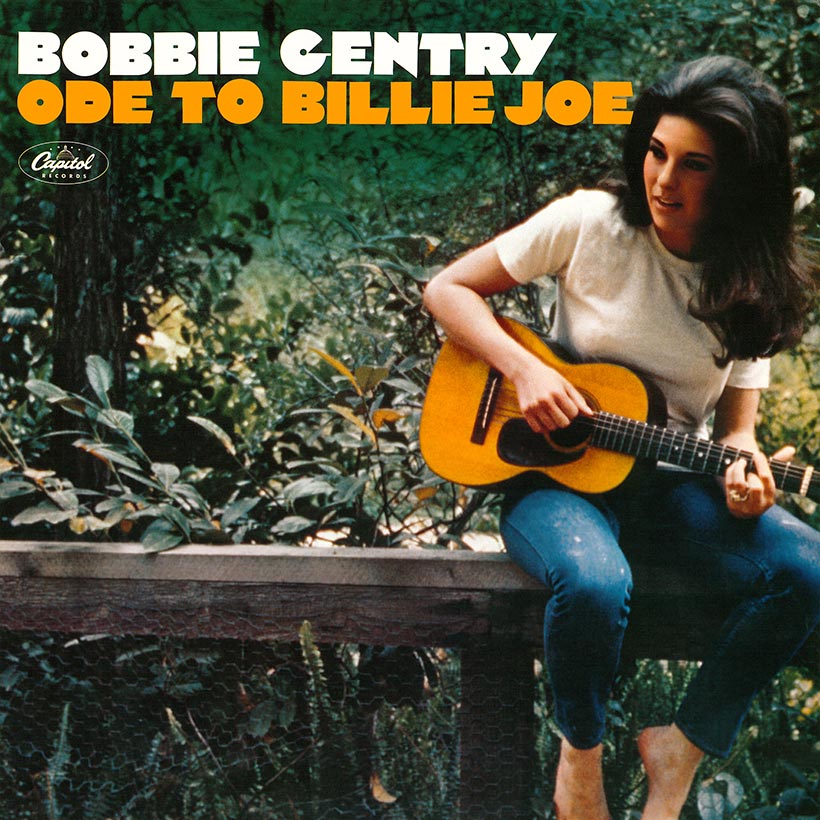You may struggle to believe it, but at the height of the Summer Of Love, the haunting title track to Bobbie Gentry’s debut album, Ode To Billie Joe, knocked The Beatles’ ‘All You Need is Love’ off the top of Billboard’s Hot 100. A dark and tense song, half country ballad, half Southern gothic murder mystery, ‘Ode To Billie Joe’ certainly wasn’t a hippified number, but credit the public for recognizing the beauty, brains, and brilliance of the artist in question. Or as one reviewer put it: “If she didn’t have a Miss America type figure (37-23-37) you might call her an intellectual.” Aw, shucks.
This tale of star-crossed lovers involved in peculiar shenanigans in Mississippi’s Choctaw Ridge sent tongues wagging in the narrative. A small-town intrigue that functions as a musical version of a classic American short story, ‘Ode To Billie Joe’ is a cut that keeps razor-sharp but can never be properly resolved, since Gentry refuses to let on as to what was thrown off the Tallahatchie Bridge by Billie Joe McAllister. She picked up her two Grammy Awards with an insouciant smile.
When Ode To Billie Joe came out a month later (August 1967) it also topped the Pop and Country charts, and made No.5 on the Black Albums charts, testimony to Gentry’s soulful delivery. In many ways, she pioneered the female version of Muscle Shoals-style beats, and she provided a real badass guitar, whether playing electric or acoustic. Such was the demand for the album that Capitol pressed an unprecedented 500,000 copies (the previous record was 100,000 for Meet The Beatles!).
Gritty authenticity
The big hit was left until last on the album, which was produced by Kelly Gordon and orchestrated by Jimmy Haskell (who also grabbed a Grammy for his arrangement on the single), but Ode To Billie Joe was far more than nine filler songs and the smash. The opening ‘Mississippi Delta’ is another peach, with an atmosphere and narrative structure reminiscent of Jimmy Webb and Tom T Hall. The country blues ‘I Saw An Angel Die’ is a doozy, while the autobiographical ‘Chickasaw County Child’ and the down-home ‘Sunday Best’ have elements of rural white gospel. There is also an air of gritty authenticity in ‘Bugs’, a childhood recollection of living on a farm with dirt-poor hillbilly folks.
The only song not written by Gentry is Jim Ford’s ‘Niki Hoeky’, a fine slice of hokum with a deep groove that showcases her versatility. The jazzier arrangement of ‘Papa, Woncha Let Me Go to Town With You’ sends Side Two of the album off on a left turn, and then there’s the charming chastisement of ‘Lazy Willy’ to raise a smile before we get back round the kitchen table for ‘Ode To Billie Joe’ – in its original version a much longer song with extra verses that Gentry dialed down for commercial impact.
A lasting legacy
Though she achieved further fame working with Glen Campbell, and became the first woman to host her own TV variety series – for the BBC, in the years 1968 to 1971 – Gentry didn’t duplicate her initial success as a solo artist, but she was savvy enough to land a million-dollar contract to star in a nightclub revue in Las Vegas. There were also high-profile appearances on TV shows hosted by Campbell, Tom Jones, Andy Williams, Carol Burnett, and Bobby Darin.
The big hit that started it all won her a place in the Grammy Hall Of Fame in 1999, and, lest we forget, Ode To Billie Joe also displaced Sgt Pepper’s Lonely Heart Club Band from the top spot in October 1967, making Gentry a triple thorn in The Beatles’ side.
The career-spanning Bobbie Gentry 8CD box set, The Girl From Chickasaw County, and can be bought here.



